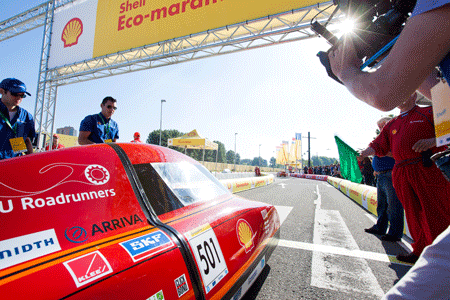DTU Roadrunners took first place in the Shell Eco Marathon on Sunday afternoon with their bioethanol-powered car called Dynamo, covering an impressive 599 km on the equivalent of one litre of petrol.
It’s not a matter of crossing the finishing line first, but rather of using as little fuel as possible! The winner of the Shell Eco Marathon is the team that succeeds in driving the longest distance on the equivalent of a litre of petrol.
This year, the DTU Roadrunners team covered a total of 599 km—a distance sufficient to assure them not only a comfortable victory in the Alternative Fuel class, but also a win over all the combustion engines in the Urban Concept/city car category.
However, the competition was not without its problems this year and the final stages were nail-biting for the DTU team, which was attempting to beat its own world record of 612.3 km/l from the previous year.
Green European Championship
This year marked the thirtieth successive edition of The Shell Eco Marathon, and the event was held on three different continents. As the competition is growing every year, it increasingly resembles a giant festival for technology enthusiasts keen to challenge the range of different types of fuel.
In all, around 2,000 students from 22 different countries took part, entering almost 200 different vehicles in the European edition of the Eco Marathon, which was held in the streets of Rotterdam in the period 15–18 May.
The event is organized like an authentic F1 race, but it is considerably quieter, with the vehicles rolling gently across the start line powered by their energy-appropriate engines.

Hard work paid off
Each team is allocated three time slots to complete a total of four attempts, with only their best time taken into account. After a hectic week in the DTU pit—with a seemingly unbroken chain of technical issues—the first attempts were a disappointment to the team. In fact, things went so badly that the team chose to spend the whole of Saturday evening dismantling the car completely so as to optimize the separate components. The strategy paid dividends.
Sunday, in its third attempt, the team covered 80 km more on the litre than on the day before. This was not enough to beat DTU’s own world record from 2013, but it was nevertheless a very satisfied team that lifted the trophy in celebration of a hard-fought victory:
“I’m so proud of the whole team; we really worked together as a unit. We have put in so much preparation during the week, and we managed to secure victory despite a series of crises. We are all delighted,” said Simon Klint Bergh, team leader, after the judges announced their decision.
There are two categories to compete in at the Shell Eco Marathon: the prototype class, where teams are allowed to experiment with the shape of the vehicle so as to reduce friction, for example; and the Urban Concept—the city car class—where the vehicle has to resemble an actual car as far as possible and, for example, must stop at least once a lap to simulate urban driving. It was in the latter category that DTU made its mark.
Wealth of new knowledge to take home
The Shell Eco Marathon serves as the final project of an eco-vehicle course at DTU that covers two semesters and earns the participating students 10 ECTS credits. This means the most important aspect is for the students to soak up as much experience as possible—even though the taste of victory may be sweet.
“The students learn a great deal about energy and technology, and about how to make things work in practice. Most of all, they learn to work as a team. There were some issues with the engine ignition that we hadn’t experienced back home, so we had to deal with them in the field. The students worked very systematically and carried out efficient troubleshooting as they went along. We are delighted and satisfied,” said Associate Professor Jesper Schramm, course manager, before the team was awarded its richly deserved trophy.
• Fuel: Bioethanol E100 (second generation, supplied by Inbicon)
• Engine: 49 cc motor Yamaha Neo 4 (modified moped motor)
• hp/Nm: approx. 2.5 hp at 6,000 rpm – 3.4 Nm at 5,000 rpm
• Top speed: 50 km/h
• Class: Urban Concept, combustion engines
• Weight: approx. 100 kg.
• Chassis: Aerodynamic shell made of thin carbon fibre
• Bodywork: Self-supporting carbon fibre monocoque
• Wheels/suspension: Carbon fibre hubs fitted with Michelin tyres
• Steering wheel: 3D printed
• KERS: regenerating brake system based on electric motor, clutch, etc. (Maxon Motor 400W)